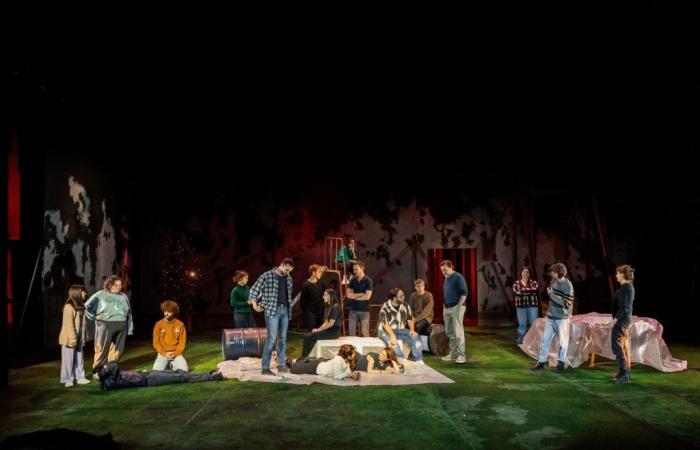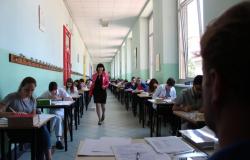One day, at the end of the last millennium, it is said after having seen “Romeo + Juliet” by Baz Luhrmann, Keira Knightley asked her mother Sharman Macdonald to start writing a sequel, or what could have happened to the Veronese Capulets and Montagues, family members and friends, once the young and unfortunate lovers were buried inside the crypt and once peace was signed by Prince Escalus within the city walls. From the daughter’s proposal “After Juliet” was born, a text where very little peace was savored, where those who had had an easy hand with swords in the past continued in their pastime of more or less bloody altercations and brawls, where the city of Verona, looking at it with a contemporary eye, it easily became the peripheral terrain of Edinburgh or New York, of Liverpool or Dublin, where with a happy flicker that Rosaline took shape and importance as a protagonist who in the initial dreams occupied the heart and mind of the beautiful Romeo but which then, as we know, had to give way. Of course, a truce exists, according to the prince’s directives, but the fire continues to smolder under the ashes. There is room for a loving approach between Benvolio and Rosalina, who shows a feline character who is always impetuous and ready for a fight, there is room for the plots of Valentine, the twin brother of the late Mercutio, there is the good Petruchio, brother of Tybalt, who would like to live in peace. While the court, in the trial that followed the death of the two boys, sentences the nurse to exile and the gallows to the apothecary who supplied the poison, Benvolio foils a duel that already sees Rosalina and Valentine with weapons in hand.
In this daily life always lived on the razor’s edge, “a modern fairy tale is built that speaks of love and hate, hope and redemption”, underlines Filippo Dini in his director’s notes. It is the mirror of a hatred that continues, that passes from father to son, of a past that returns, that continues without the slightest suspicion of wanting to change, it is a daily life in which a battered and perpetually defensive youth struggles. , is the expectation of the enemy and the ambush. But also of memories, of untapped sensations, of a love thrown away. But “After Juliet” is also the opposite side of the Shakespearean precedent, it is the cancellation of the high verse and language, it is the contemporary dragged away without flashes and convictions, palely (you would almost feel like Romeo to say “shut up, shut up, Mercutio, shut up!, you are talking about nothing”), is the presence of characters and ghosts that have the same vain consistency as the text, where the facts fill the page and the scene without however convincing, without creating the horizon of a feeling , of an involvement. Looking out at a certain moment in the 100′ of the show even a slight boredom. In short, a text whose absence was not noticeable. The positive sign, good God, is to get to know, among the many students of the Turin Stabile Theater School who populate the diptych of “Prato Inglese” (until 14 July on the Carignano stage), a young actress ( let’s define her that way, she has the merits), of her maturity and her authenticity: her name is Maria Trenta, she plays Rosalina, she does it with anger and candor and with all the regret of the past time, she carries out a first monologue first of all in an excellent way, it is strong in tones and reflections, confident, a good test, a beginning that will hopefully lead to other titles, to other stages.
What went worse was the “Romeo and Juliet” seen the previous evening. It is Dini’s farewell note, definitively leaving and called today to govern the fortunes of the Stabile Veneto, which gave us appreciated shows with good if not excellent success, such as “Così è (se vi pare)”, “Misery”, “Ghiaccio”, a great “Crogiuolo” by Miller and an equally convincing “Osage County”, shows that made us appreciate him, perhaps discuss him, but which always had to be recognized as having great dramaturgical and effective honesty. Finally, we stumbled upon Shakespeare, alas the poor, tattered, grimly updated, full of solutions and (serious) directorial sins that leave their mark and the spectator astonished and increasingly groping in the dark. If you have the text in your hands, maybe I’m saying a bad word?, straight of all time, a boy and a girl who meet and love each other and go towards death, because – and it’s not homophobic speech! – you have to take that boy’s traits away from Romeo to entrust them to a female interpreter, with a choice that appears somewhere between the shrewd and the forced and the fake, and that choice is neither right nor coherent, and think precisely on one occasion like this one to a homosexual relationship. Because the nurse must have been born under the smoking cone of Vesuvius, because it is mandatory to show the young people of Verona as examples of metropolitan gangs, in continuous guerrilla warfare, in camouflage suits, with broadswords and stones with which to crush your skull. Why hire the Carignano stages to dress them up as Juliet’s distant balcony, why force young actors into exhausting and continuous shouting even if at the moment there is no need to do so (even Friar Laurence yelling?). Because, everyone on stage, the final cherry on top, with bright dramatic tones and a large number of ferocious blows on the chest, sing Mickey’s march that “only you can understand the thousand and thousand dreams of a child”. If they come out like disheveled cats, you realize that of all the poetry found very well in other previous stagings not even dating back to who knows when there are only crumbs left, that all you are left with is the deafening noise and carnage of the war. I don’t think “Romeo and Juliet” is just that. The young actors give it their all, most with diligence and many with passion; if Martina Montini’s weak Juliet is not convincing, Alice Fazzi’s Romeo tries to express impetuosity and attitudes more suited to a male personality, Iacopo Ferro’s Mercutio has the notes are most of the time correct and perhaps the most convinced and convincing of the evening seems to be Samuele Finocchiaro’s Capulet – when he dictates the ultimatum to his daughter there is no need to distort the text and update it visually, the message comes out loud and well defined from the words that are more than five hundred years old: they give you chills in the same way -, combined with his wife Hana Daneri.
Elio Rabbione
In the images, the director Filippo Dini and a moment of rehearsals (photo by Luigi De Palma).
Read the latest news here: THE TORINESE






